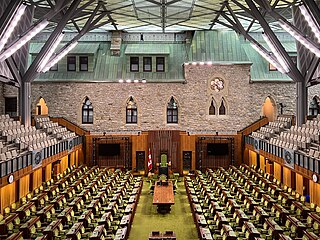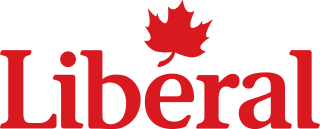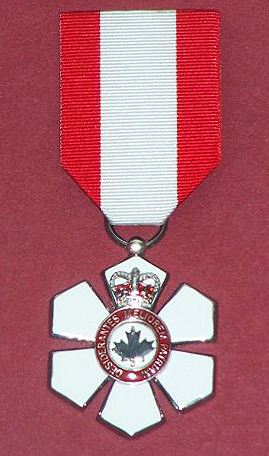Related Research Articles

Alberta is one of the thirteen provinces and territories of Canada. It is part of Western Canada and is one of the three prairie provinces. Alberta is bordered by British Columbia to the west, Saskatchewan to the east, the Northwest Territories (NWT) to the north, and the U.S. state of Montana to the south. It is one of the only two landlocked provinces in Canada. The eastern part of the province is occupied by the Great Plains, while the western part borders the Rocky Mountains. The province has a predominantly continental climate but experiences quick temperature changes due to air aridity. Seasonal temperature swings are less pronounced in western Alberta due to occasional Chinook winds.

The National Hockey League is a professional ice hockey league in North America comprising 32 teams—25 in the United States and 7 in Canada. The Stanley Cup, the oldest professional sports trophy in North America, is awarded annually to the league playoff champion at the end of each season. The NHL is one of the major professional sports leagues in the United States and Canada and is considered to be the top ranked professional ice hockey league in the world, with players from 18 countries as of the 2022–23 season. The International Ice Hockey Federation (IIHF) also views the Stanley Cup as one of the "most important championships available to the sport".

Newfoundland and Labrador is the easternmost province of Canada, in the country's Atlantic region. The province comprises the island of Newfoundland and the continental region of Labrador, having a total size of 405,212 square kilometres. In 2023, the population of Newfoundland and Labrador was estimated to be 533,710. The island of Newfoundland is home to around 94 per cent of the province's population, with more than half residing in the Avalon Peninsula. Labrador borders the province of Quebec, and the French overseas collectivity of Saint Pierre and Miquelon lies about 20 km (12 mi) west of the Burin Peninsula.

The prime minister of Canada is the head of government of Canada. Not outlined in any constitutional document, the office exists only per long-established convention. Under the Westminster system, the prime minister governs with the confidence of a majority of the elected House of Commons; as such, the prime minister typically sits as a member of Parliament (MP) and leads the largest party or a coalition of parties. The prime minister is appointed by the monarch's representative, the governor general, and, as first minister, selects other ministers to form the Cabinet and chairs it. Constitutionally, executive authority is vested in the monarch, but, in practice, the powers of the monarch and governor general are nearly always exercised on the advice of the Cabinet, which is collectively responsible to the House of Commons. Canadian prime ministers are appointed to the Privy Council and styled as the Right Honourable, a privilege maintained for life.

Joseph Philippe Pierre Yves Elliott Trudeau was a Canadian lawyer and politician who served as the 15th prime minister of Canada from 1968 to 1979 and from 1980 to 1984. He also briefly served as the leader of the Opposition from 1979 to 1980.

Saskatchewan is a province in Western Canada, bordered on the west by Alberta, on the north by the Northwest Territories, on the east by Manitoba, to the northeast by Nunavut, and on the south by the United States. Saskatchewan and Alberta are the only landlocked provinces of Canada. In 2023, Saskatchewan's population was estimated at 1,221,439. Nearly 10% of Saskatchewan's total area of 651,900 km2 (251,700 sq mi) is fresh water, mostly rivers, reservoirs, and lakes.
A Tory is an individual who supports a political philosophy known as Toryism, based on a British version of traditionalist conservatism which upholds the established social order as it has evolved through the history of Great Britain. The Tory ethos has been summed up with the phrase "God, King, and Country". Tories are monarchists, were historically of a high church Anglican religious heritage, and were opposed to the liberalism of the Whig party.

The House of Commons of Canada is the lower house of the Parliament of Canada. Together with the Crown and the Senate of Canada, they comprise the bicameral legislature of Canada.

Terrance Stanley Fox was a Canadian athlete, humanitarian, and cancer research activist. In 1980, with one leg having been amputated due to cancer, he embarked on an east-to-west cross-Canada run to raise money and awareness for cancer research. Although the spread of his cancer eventually forced him to end his quest after 143 days and 5,373 kilometres (3,339 mi), and ultimately cost him his life, his efforts resulted in a lasting, worldwide legacy. The annual Terry Fox Run, first held in 1981, has grown to involve millions of participants in over 60 countries and is now the world's largest one-day fundraiser for cancer research; over C$850 million has been raised in his name as of September 2022.

The National Flag of Canada, often simply referred to as the Canadian flag or, unofficially, as the maple leaf flag or l'Unifolié, consists of a red field with a white square at its centre in the ratio of 1∶2∶1, in which is featured a stylized, red, 11-pointed maple leaf charged in the centre. It is the first flag to have been adopted by both houses of Parliament and officially proclaimed by the Canadian monarch as the country's official national flag. The flag has become the predominant and most recognizable national symbol of Canada.

The Liberal Party of Canada is a federal political party in Canada. The party espouses the principles of liberalism, and generally sits at the centre to centre-left of the Canadian political spectrum, with their main rival, the Conservative Party, positioned to their right and the New Democratic Party positioned to their left. The party is described as "big tent", practising "brokerage politics", attracting support from a broad spectrum of voters. The Liberal Party is the longest-serving and oldest active federal political party in the country, and has dominated federal politics of Canada for much of its history, holding power for almost 70 years of the 20th century. As a result, it has sometimes been referred to as Canada's "natural governing party".

The Order of Canada is a Canadian state order and the second-highest honour for merit in the system of orders, decorations, and medals of Canada, after the Order of Merit.

The Canadian Armed Forces are the unified military forces of Canada, including sea, land, and air elements referred to as the Canadian Army, Royal Canadian Navy, Royal Canadian Air Force, and Canadian Special Operations Forces Command.
The Conservative Party of Canada, colloquially known as the Tories, is a federal political party in Canada. It was formed in 2003 by the merger of the two main right-leaning parties, the Progressive Conservative Party and the Canadian Alliance, the latter being the successor of the Western Canadian–based Reform Party. The party sits at the centre-right to the right of the Canadian political spectrum, with their federal rival, the Liberal Party of Canada, positioned to their left. The Conservatives are defined as a "big tent" party, practising "brokerage politics" and welcoming a broad variety of members, including "Red Tories" and "Blue Tories".

Justin Pierre James Trudeau is a Canadian politician who has served as the 23rd prime minister of Canada since 2015 and the leader of the Liberal Party since 2013.

The Métis are an Indigenous people whose historical homelands includes Canada's three Prairie Provinces, as well as parts of British Columbia, the Northwest Territories, Northwest Ontario and the Northern United States. They have a shared history and culture, deriving from specific mixed European and Indigenous ancestry, which became distinct through ethnogenesis by the mid-18th century, during the early years of the North American fur trade.

Pierre Marcel Poilievre is a Canadian politician who has served as the leader of the Conservative Party of Canada and the leader of the Official Opposition since 2022. Poilievre has served as a member of Parliament (MP) since 2004.

Anthony Michael Gerard Rota is a Canadian politician who served as the 37th speaker of the House of Commons of Canada from 2019 until his resignation in 2023. A member of the Liberal Party, he currently serves as the member of Parliament (MP) for the riding of Nipissing—Timiskaming. He previously represented Nipissing—Timiskaming as MP from 2004 to 2011. In 2019, he was elected by the House of Commons to be the speaker in the 43rd Parliament and in 2021 was re-elected in the 44th Parliament.

Montreal is the second most populous city in Canada, the eighth most populous city in North America, and the most populous city in the province of Quebec. Founded in 1642 as Ville-Marie, or "City of Mary", it is named after Mount Royal, the triple-peaked hill around which the early city of Ville-Marie was built. The city is centred on the Island of Montreal, which obtained its name from the same origin as the city, and a few much smaller peripheral islands, the largest of which is Île Bizard. The city is 196 km (122 mi) east of the national capital Ottawa, and 258 km (160 mi) southwest of the provincial capital, Quebec City.

Thanksgiving is a national holiday celebrated on various dates in the United States, Canada, Grenada, Saint Lucia, Liberia, and unofficially in countries like Brazil and Philippines. It is also observed in the Dutch town of Leiden and the Australian territory of Norfolk Island. It began as a day of giving thanks for the blessings of the harvest and of the preceding year. Thanksgiving is celebrated on the second Monday of October in Canada and on the fourth Thursday of November in the United States and around the same part of the year in other places. Although Thanksgiving has historical roots in religious and cultural traditions, it has long been celebrated as a secular holiday as well.